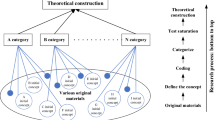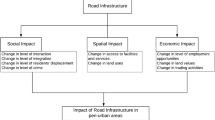Abstract
History has brought us into a significant moment when the majority of the human kind has taken up residence in urban settlements. The focus of global urbanization has shifted to the developing world and the center of manufacturing is no longer confined to the Global North. This paper provides a periodical assessment of the current status of China’s urban transformation in the global context of a shifting emphasis of industrialization and urbanization. China’s phenomenal urban transformation deserves a special attention not only because of its unparalleled scale and speed but also because of its distinct trajectory of growth that does not conform to normal theoretical expectations. The results of assessment revealed an urban economy with remarkable hybridity, a society that is increasingly stratified, polarized, and segregated, and a juxtaposed urban space undergoing restless and pervasive transformation. A decentering world should entail a decentering knowledge production. A critical reflection upon the Chinese patterns and processes of urban transformation has identified 4 main issues with great potentials for innovative knowledge production, namely: 1) privatization and economic development; 2) state, society, and space; 3) urbanization of capital, labor, and land; and 4) the environment and Chinese political ecology. The paper closes with the remark that a rapidly transforming urban China has presented itself as a fertile and resourceful testing ground for critical and innovative geographic enquiries.
Similar content being viewed by others
References
Amin A, Thrift N, 1994. Globalization, Institutions and Regional Development in Europe. Oxford: Oxford University Press.
Armstrong W, McGee T G, 1985. Theatres of Accumulation: Studies in Asian and Latin American Urbanization. London: Methuen.
Blaikie P, Brookfield H, 1987. Land Degradation and Society. London: Methuen.
Brandt L, Rawski T, 2008. China’s Great Economic Transformation. New York: Cambridge University Press.
Brenner Neil, Theodore Nik, 2002. Spaces of Neoliberalism: Urban Restructuring in North America and Western Europe. Malden, MA: Blackwell.
Chan Kam Wing, 2007. Misconceptions and complexities in the study of China’s cities: Definitions, statistics, and implications. Eurasian Geography and Economics, 48(4): 382–412. DOI: 10.2747/1538-7216.48.4.383
Dick H W, Rimmer P J, 1998. Beyond the third world city: The new urban geography of south-east Asia. Urban Studies, 35(12): 2303–2321. DOI: 10.1080/0042098983890
Fan C Cindy, 2008. China on the Move: Migration, the State, and the Household. London: Routledge.
Friedman Thomas L, 2005. The World Is Flat: A Brief History of The Globalized World in The Twenty-First Century. London: Allen Lane.
Fu B J, 2008. Blue skies for China. Science, 321: 611.
Fu B J, Zhuang X L, Jiang G B et al., 2007. Environmental problems and challenges in China. Environmental Science & Technology, 42: 7597–7602.
Glassman Jim, 2006. Primitive accumulation, accumulation by dispossession, accumulation by ‘extra-economic’ means. Progress in Human Geography, 30(5): 608–625. DOI: 10.1177/03-09132506070172.
Hardin G, 1968. The tragedy of the commons. Science, (162): 1243–1248.
Harvey D, 1985. The Urbanization of Capital: Studies in the History and Theory of Capitalist Urbanization. Baltimore: Johns Hopkins University Press.
Harvey D, 2003. The New Imperialism. New York: Oxford University Press.
Harvey D, 2005. A Brief History of Neoliberalism. Oxford: Oxford University Press.
Ho Peter, 2005. Introduction: the chicken of institutions or the egg of reforms. In: Peter Ho (ed.). Developmental Dilemmas: Land Reform and Institutional Change in China. London: Routledge.
Ho Samuel P S, Lin George C S, 2004. Converting land to nonagricultural use in China’s coastal provinces: Evidence from Jiangsu. Modern China, 30(1): 81–112. DOI: 10.1177/00977004-03259131
Hsing You-tien, 2010. The Great Urban Transformation. New York: Oxford University Press.
Huang P C C, 1990. The Peasant Family and Rural Development in the Yangzi Delta: 1350–1988. Palo Alto, CA: Stanford University Press.
Huang Yasheng, 2008. Capitalism with Chinese Characteristics: Entrepreneurship and The State. Cambridge: Cambridge University Press.
Jessop B, 2002. Liberalism, neoliberalism, and urban governance: A state-theoretical perspective. In: Brenner Neil et al. (eds.). Spaces of Neoliberalism: Urban restructuring in North America and Western Europe. Malden, MA: Blackwell, 105–125.
Krugman P, 1991. Geography and Trade. Cambridge, MA: MIT Press.
Krugman P, 1995. Development, Geography and Economic Theory. Cambridge, MA: MIT Press.
Liang Z, Ma Z, 2004. China’s floating population: New evidence from the 2000 census. Population and Development Review, 30(3): 467–488. DOI: 10.1111/j.1728-4457.2004.00024.x
Lin G C S, 1997. Red Capitalism in South China: Growth and Development of the Pearl River Delta. Vancouver: University of British Columbia Press.
Lin G C S, 1998. China’s industrialization with controlled urbanization: Anti-urbanism or urban-biased? Issues & Studies, 34(6): 98–116.
Lin G C S, 2002. The growth and structural change of Chinese Cities: A contextual and geographic analysis. Cities, 19(5): 299–316. DOI: 10.1016/S0264-2751(02)00039-2
Lin G C S, 2007a. Reproducing spaces of Chinese urbanization: New city-based and land-centered urban transformation. Urban Studies, 44(9): 1827–1855. DOI: 10.1080/00420980701426673
Lin G C S, 2007b. Chinese urbanism in question: State, society, and the reproduction of urban spaces. Urban Geography, 28(1): 7–29. DOI: 10.2747/0272-3638.28.1.7
Lin G C S, 2009a. Developing China: Land, Politics, and Social Conditions. London: Routledge.
Lin G C S, 2009b. Scaling-up regional development in globalizing China: Local capital accumulation, land-centred politics, and reproduction of space. Regional Studies, 43(3): 429–447. DOI: 10.1080/00343400802662625
Lin G C S, 2009c. Decentering geography in a globalizing world: A golden jubilee celebration of UBC’s area studies tradition. World Regional Studies, 18(4): 1–16. (in Chinese)
Lin G C S, Ho S P S, 2003. China’s land resources and land use change: Insights from the 1996 land survey. Land Use Policy, 20(3): 92. DOI: 10.1016/S0264-8377(03)00007-3
Lin G C S, Ho S P S, 2005. The state, land system, and land development processes in contemporary China. Annals of the Association of American Geographers, 95(2): 411–436. DOI: 10.1111/j.1467-8306.2005.00467.x
Lin G C S, Wei Y H D, 2002. China’s restless urban landscape 1: New challenges for theoretical reconstruction. Environment and Planning A, 34(9): 1535–1544. DOI: 10.1068/a3409ed
Logan J, Molotch H, 1987. Urban Fortunes: The Political Economy of Place. Berkeley: University of California Press.
Ma Laurence J C, 2009. China’s authoritarian capitalism: Growth, elitism and legitimacy. International Development Planning Review, 31(1): i–xii. DOI: 10.3828/idpr.31.1.1
Ma Laurence J C, Fan M, 1994. Urbanization from below—The growth of towns in Jiangsu, China. Urban Studies, 31(10): 1625–1645. DOI: 10.1080/00420989420081551
Ma Laurence J C, Lin G C S, 1993. Development of towns in China: A case study of Guangdong Province. Population and Development Review, 19(3): 583–606.
Ma Laurence J C, Wu Fulong, 2005. Restructuring the Chinese city: Diverse processes and reconstituted spaces. In: Laurence J C Ma et al. (eds.). Restructuring the Chinese City. London: Routledge, 1–20.
MacLeod G, Goodwin M, 1999. Space, scale and state strategy: Rethinking urban and regional governance. Progress in Human Geography, 23(4): 503–527. DOI: 10.1191/030913299669861-026
Marcotullion P J, Lee Y S F, 2003. Urban environmental transitions and urban transportation systems: A comparison of the North American and Asian experiences. International Development Planning Review, 25(4): 325–354. DOI: 10.3828/idpr.25.4.2
McCarthy J, 2002. First world political ecology: Lessons from the wise use movement. Environment and Planning A, 34: 1281–1302. DOI: 10.1068/a3526
McGee T G, 1991. Presidential address: Eurocentrism in geography: The case of Asian urbanization. Canadian Geographer: 35(4): 332–344. DOI: 10.1111/j.1541-0064.1991.tb01298.x
McGee T G, 2007. Many knowledge(s) of Southeast Asia: Rethinking Southeast Asia in read time. Asia Pacific Viewpoint, 48(2): 270–280. DOI: 10.1111/j.1467-8373.2007.00339.x
McGee T G, Lin George C S, Marton Andrew M et al., 2007. China’s Urban Space: Development under Market Socialism. London: Routledge.
Nathan, Andrew, 2003. Authoritarian resilience. Journal of Democracy, 9(1): 6–17. DOI: 10.1353/jod.2003.0019
NBSC (National Bureau of Statistics of China), 2006. China Statistical Yearbook. Beijing: China Statistics Press. (in Chinese)
NBSC, 2009. China Statistical Abstract (2009). Beijing: China Statistics Press. (in Chinese)
Nee Victor, Swedberg Richard, 2007. On Capitalism. Stanford: Stanford University Press.
Ohmae K, 1990. The Borderless World. London: HarperCollins.
Oke T R, 1982. The energetic basis of the urban heat island. Quarterly Journal of the Royal Meteorological Society, 108: 1–24. DOI: 10.1002/qj.49710845502
Oke T R, 1987. Boundary Layer Climate. London: Methuen.
Ong Aihwa, 1999. Flexible Citizenship: The Cultural Logics of Transnationality. Durham, N.C.: Duke University Press.
Pannell Clifton W, 1992. The role of great cities in China. In: G E Guldin (ed.). Urbanizing China. Westport: Greenwood Press, 11–39.
Peck Jamie, 2001. Neoliberalizing states: Thin policies/hard outcomes. Progress in Human Geography, 25(3): 445–455. DOI: 10.1191/030913201680191772
Pei Minxin, 2006. China’s Trapped Transition: The Limits of Developmental Autocracy. Cambridge, MA: Harvard University Press.
Porter M, 1990. The Competitive Advantage of Nations. London: Macmillan.
Porter M, 1998. On Competition. Cambridge, MA: Harvard University Press.
Prudham W S, 2005. Knock on Wood: Nature as Commodity in Douglas-Fir Country. New York: Routledge.
Putterman Louis, 1995. The role of ownership and property rights in China’s economic transition. The China Quarterly, 144: 1047–1064. DOI: 10.1017/S0305741000004720
Saxenian A L, 1994. Regional advantage: Culture and competition in Silicon Valley and route 128. Boston: Harvard University Press.
Schubert Gunter, 2008. One-party rule and the question of legitimacy in contemporary China: Preliminary thoughts on setting up a new research agenda. Journal of Contemporary China, 17(54): 191–204. DOI: 10.1080/10670560701693153
Scott A J, 1998. Regions and the World Economy: The Coming Shape of Global Production, Competition, and Political Order. Oxford: Oxford University Press.
Scott A J, Storper M, 2003. Regions, globalization, development. Regional Studies, 37(6 & 7): 579–593. DOI: 10.1080/0034340032000108697
Smart A, 1997. Oriental despotism and sugar-coated bullets: Representations of the market in China. In: James G Carrier (ed.). Meanings of the Market. Oxford: Berg. 159–194.
Solinger D J, 1999. Contesting Citizenship in Urban China. Berkeley C A: University of California Press.
Solinger D J, 2003. State and society in urban China in the wake of the 16th Party Congress. The China Quarterly, 176: 943–959. DOI: 10.1017/S0305741003000560
Stone C, 1989. Regime Politics: Governing Atlanta, 1946–1988. Lawrence: University Press of Kansas.
Storper M, 1997. The Regional World: Territorial Development in a Global Economy. New York: Guilford.
Tickell A T, Peck J A, 1995. Social regulation after-Fordism: Regulation theory, neoliberalism and the global-local nexus. Economy and Society, 24(3): 357–386. DOI: 10.1080/0308514-9500000015
Vogel E F, 1979. Japan as Number One: Lessons for America. Cambridge, MA: Harvard University Press.
Walder Andrew G, 1995. China’s transitional economy: Interpreting its significance. The China Quarterly, 144: 963–979. DOI: 10.1017/S0305741000004689
Walker P A, 2003. Reconsidering ‘regional’ political ecologies: Toward a political ecology of the rural American West. Progress in Human Geography, 27(1): 7–24. DOI: 10.1191/0309132503ph410oa
Walker P A, 2005. Political ecology: Where is the ecology? Progress in Human Geography, 29(1): 73–82. DOI: 10.1191/0309-132505ph530pr
Walker P A, 2006. Political ecology: Where is the policy? Progress in Human Geography, 30(3): 382–395. DOI: 10.1191/03-09132506ph613pr
Walker Richard, Buck Daniel, 2007. The Chinese road: Cities in the transition to capitalism. New Left Review, 46: 39–66.
World Bank, 2008. World Development Report 2009: Reshaping Economic Geography. Washington, D.C.: the World Bank.
World Bank, 2010. Cities growing as people move from the countryside in search of better jobs and living conditions. Available from: http://youthink.worldbank.org/issues/urbanization Accessed 16 July 2010.
Wu Fulong, 2008. China’s great transformation: Neoliberalization as establishing a market society. Geoforum, 39: 1093–1096. DOI: 10.1016/j.geoforum.2008.01.007
Yeung H W C, Lin G C S, 2003. Theorizing Economic Geographies of Asia. Economic Geography, 79(2): 107–128. DOI: 10.1111/j.1944-8287.2003.tb00204.x
Zhou Y, Ma L J C, 2003. China’s urbanization levels: Reconstructuring a baseline from the fifth population census. The China Quarterly, 173: 176–196. DOI: 10.1017/S00094439030-0010X
Author information
Authors and Affiliations
Corresponding author
Additional information
Foundation item: Under the auspices of the Research Grants Council of the Hong Kong Special Administrative Region, China (No. GRF HKU-747509H), Mrs. Li Ka Shing Fund for Contemporary China Studies Strategic Research Theme (No. HKU-20388025), the Small Project Funding of the University of Hong Kong (No. HKU-10400706)
Rights and permissions
About this article
Cite this article
Lin, G.C.S. Urban China in transformation: Hybrid economy, juxtaposed space, and new testing ground for geographical enquiries. Chin. Geogr. Sci. 21, 1–16 (2011). https://doi.org/10.1007/s11769-010-0426-0
Received:
Accepted:
Published:
Issue Date:
DOI: https://doi.org/10.1007/s11769-010-0426-0




